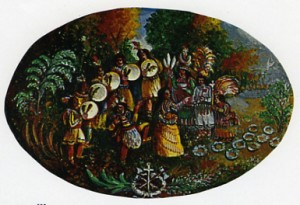
Among the indigenous peoples of Montana, being a warrior was not an exclusively male occupation. Women commonly dominated the realms of housekeeping, food preparation, and child rearing. They influenced leadership, articulated their political concerns, and exercised a great deal of control over economic, domestic, and intertribal matters. A few women, however, gave up their traditional domestic role altogether and became “career warriors.”
People who knew these female warriors personally—tribal members, traders, missionaries, and military officers—provide details about their lives in oral histories, expedition journals, and drawings. The women’s military skill and bravery caught non-Indians off guard since they were unaccustomed to women participating in combat. The women’s male enemies were perhaps even more taken aback, sometimes fearing these women warriors possessed special, even supernatural abilities.
One especially fearless warrior was Kaúxuma Núpika, a Kootenai woman who was also a cultural intermediary and prophet. In 1808, young Kaúxuma Núpika married a Frenchman working for the explorer David Thompson. She was so rowdy that Thompson exiled her from his camp. She divorced her husband, claimed to have been changed into a man, and then took a succession of wives. Continue reading Nineteenth-Century Indigenous Women Warriors